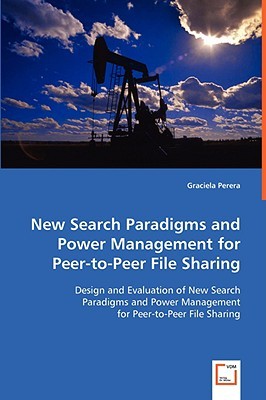
- We will send in 10–14 business days.
- Author: Graciela Perera
- Publisher: VDM Verlag Dr. Mueller E.K.
- Year: 2008
- Pages: 128
- ISBN-10: 3639004809
- ISBN-13: 9783639004809
- Format: 15.2 x 22.9 x 0.7 cm, softcover
- Language: English
- SAVE -10% with code: EXTRA
New Search Paradigms and Power Management for Peer-to-Peer File Sharing (e-book) (used book) | bookbook.eu
Reviews
Description
Current estimates are that more than nine million PCs in the U.S. are part of Peer-to-Peer (P2P) file sharing overlay networks on the Inter-net. These P2P hosts generate about 20% of the traffic on the Internet and consume about 7.8 TWh/yr equal to $630 million per year. The impact of reducing P2P overhead traffic and electricity usage as the Internet grows is of great interest and yields considerable energy and bandwidth savings. In this book, two new search paradigms with reduced overhead traffic and P2P power management are investigated. The new Targeted Search method uses statistics from previous searches to target future searches and is shown to reduce query overhead traffic. The new Broadcast Updates with Local Look-up Search (BULLS) protocol en-ables novel capabilities including power management. Power manage-ment in P2P networks is studied as an application of the minimum set cover problem. A reduction in overall energy consumption is achieved by powering down hosts that have all of their shared files fully shared (or covered) by other hosts. A new set cover heuristic - called the Random Map Out (RMO) - is introduced and compared to the well-known Greedy heuristic.
EXTRA 10 % discount with code: EXTRA
The promotion ends in 20d.17:38:58
The discount code is valid when purchasing from 10 €. Discounts do not stack.
- Author: Graciela Perera
- Publisher: VDM Verlag Dr. Mueller E.K.
- Year: 2008
- Pages: 128
- ISBN-10: 3639004809
- ISBN-13: 9783639004809
- Format: 15.2 x 22.9 x 0.7 cm, softcover
- Language: English English
Current estimates are that more than nine million PCs in the U.S. are part of Peer-to-Peer (P2P) file sharing overlay networks on the Inter-net. These P2P hosts generate about 20% of the traffic on the Internet and consume about 7.8 TWh/yr equal to $630 million per year. The impact of reducing P2P overhead traffic and electricity usage as the Internet grows is of great interest and yields considerable energy and bandwidth savings. In this book, two new search paradigms with reduced overhead traffic and P2P power management are investigated. The new Targeted Search method uses statistics from previous searches to target future searches and is shown to reduce query overhead traffic. The new Broadcast Updates with Local Look-up Search (BULLS) protocol en-ables novel capabilities including power management. Power manage-ment in P2P networks is studied as an application of the minimum set cover problem. A reduction in overall energy consumption is achieved by powering down hosts that have all of their shared files fully shared (or covered) by other hosts. A new set cover heuristic - called the Random Map Out (RMO) - is introduced and compared to the well-known Greedy heuristic.


Reviews